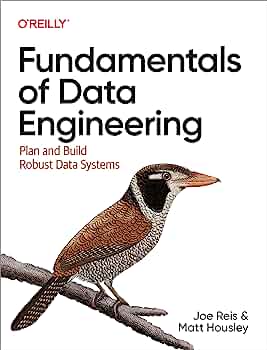
Fundamentals of Data Engineering - by Joe Reis, Matt Housley
ISBN-13: 978-1098108304
"Fundamentals of Data Engineering" by Joe Reis and Matt Housley offers an in-depth exploration into the core principles and practices that form the foundation of data engineering. This book serves as a comprehensive guide for professionals and students alike, aiming to navigate the complex landscape of data infrastructure, processing, and analysis. Covering topics from data integration and ETL processes to data warehousing, big data, and cloud services, the authors provide practical advice and insights drawn from their extensive experience in the field. A must-read for anyone looking to build or enhance their data engineering skills.
MY NOTES
Data engineering is critical for extracting value from data, enabling data scientists and analysts to perform their work effectively.
Understanding data storage and retrieval mechanisms is essential for designing efficient data systems.
Security, privacy, and ethical considerations in data engineering are highlighted, underscoring the need for responsible data management.
Data engineering is foundational for building robust and scalable data systems.
Effective data management is critical for ensuring data quality and accessibility.
Data pipelines are key to automating the flow of data from source to destination.
Understanding different data storage solutions helps in optimizing for performance and cost.
Big data technologies enable the processing and analysis of vast amounts of data.
Data lakes and data warehouses serve different purposes; knowing when to use each is vital.
Mastering SQL and NoSQL databases is essential for any data engineer.
Stream processing technologies are crucial for real-time data analysis.
Data governance policies ensure that data remains secure, compliant, and usable.
Data lineage provides visibility into the data lifecycle, enhancing trust and quality.
Machine learning models rely on clean, well-structured data for accuracy and reliability.
Automation in data engineering reduces manual errors and increases efficiency.
Cloud computing has transformed data engineering by offering scalable resources on-demand.
Data engineers must continuously adapt to new technologies and methodologies.
Data integration challenges must be addressed to provide a unified view of disparate data sources.
Ethical considerations in data handling and privacy protection are becoming increasingly important.
Effective collaboration between data engineers, data scientists, and business analysts is key to successful data projects.
Monitoring and optimizing data systems ensures they perform well and remain cost-effective.
Data quality issues can undermine the insights derived from data analytics.
Metadata management helps in understanding the context and significance of data.
Developing a data strategy aligns data projects with business objectives.
Data engineers play a crucial role in enabling data-driven decision-making.
Understanding distributed systems architecture is essential for scaling data operations.
Data privacy regulations, such as GDPR, impact data storage and processing practices.
Containerization and orchestration tools streamline the deployment of data applications.
Data engineering best practices enhance project success rates and data utility.
APIs play a crucial role in data exchange and system integration.
Data visualization tools help in communicating insights effectively to stakeholders.
Investing in continuous learning is crucial for staying relevant in the fast-evolving data engineering field.
Collaboration tools and techniques improve the productivity and effectiveness of data teams.